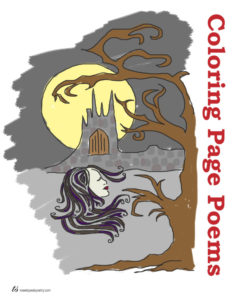Despite what the professors would have us believe, average Americans once loved poetry.”
—Dana Gioia
A friend sent me a link to an interview with former California Poet Laureate Dana Gioia. In it he recalls his mother, whom he describes as “a working-class Mexican-American woman born in poverty,” reading and reciting poetry to him when he was a child. One of the poems she knew by heart was Edgar Allan Poe’s “Annabel Lee.”
Literally the day after I read the article, “Annabel Lee” appeared at Every Day Poems. Surely it was a sign that I needed to learn it by heart too.
It is the longest poem I’ve attempted, but since it’s also a ballad, I figured it would repeat enough to make it learnable. I was correct. The poem begs to be recited aloud, around a roaring campfire while a chilly wind that is actually the ghost of a dead woman attempts to blow out the flames.
The poem also begs the speaker to sway. Try it now. Sway left as you read the lines flush to the left and sway right as you read the lines indented to the right. (Hint: Sometimes you’ll have to sway right more than once. It’s Poe, The Workout Version.)
Annabel Lee
It was many and many a year ago,
In a kingdom by the sea,
That a maiden there lived whom you may know
By the name of Annabel Lee;
And this maiden she lived with no other thought
Than to love and be loved by me.
I was a child and she was a child,
In this kingdom by the sea,
But we loved with a love that was more than love—
I and my Annabel Lee—
With a love that the wingèd seraphs of Heaven
Coveted her and me.
And this was the reason that, long ago,
In this kingdom by the sea,
A wind blew out of a cloud, chilling
My beautiful Annabel Lee;
So that her highborn kinsmen came
And bore her away from me,
To shut her up in a sepulchre
In this kingdom by the sea.
The angels, not half so happy in Heaven,
Went envying her and me—
Yes!—that was the reason (as all men know,
In this kingdom by the sea)
That the wind came out of the cloud by night,
Chilling and killing my Annabel Lee.
But our love it was stronger by far than the love
Of those who were older than we—
Of many far wiser than we—
And neither the angels in Heaven above
Nor the demons down under the sea
Can ever dissever my soul from the soul
Of the beautiful Annabel Lee;
For the moon never beams, without bringing me dreams
Of the beautiful Annabel Lee;
And the stars never rise, but I feel the bright eyes
Of the beautiful Annabel Lee;
And so, all the night-tide, I lie down by the side
Of my darling—my darling—my life and my bride,
In her sepulchre there by the sea—
In her tomb by the sounding sea.
— Edgar Allan Poe
When I told a friend I was memorizing this poem, she said it’s one she learned in school and loved. I neither love it nor hate it. Let’s just say I have so many questions.
Oh, Annabel Lee, Annabel Lee, wherefore art thou, Annabel Lee?
• The speaker says you “lived with no other thought / Than to love and be loved by me.” Really? You never said, “I’m rather handy with a dagger,” or “Look at my new dress,” or “More tea, por favor”?
• The poem says you were both children — can I get an age? Were you child-like or actually a minor when you became a bride?
• If a wind chilled and killed you, exactly how long were you outside, and why is there no mention of blizzards or sub-zero temps? Did you have an underlying medical condition?
• At the end of the poem, is your fella actually there in the tomb with you?
• You do realize you two sound like every pair of teenage lovebirds, ever, right?
Questions (and joking) aside, I enjoyed many small details that shift through the poem. I like how at first it’s “a wind” that “blew” out of “a cloud,” and then later it’s “the wind” that “came” out of “the cloud,” and it comes “by night,” not only “chilling” but “chilling and killing my Annabel Lee.”
It is also extremely pleasing to say these four lines: “And neither the angels in Heaven above / Nor the demons down under the sea / Can ever dissever my soul from the soul / Of the beautiful Annabel Lee.” Perhaps parents should consider whether their children’s names have as much poetic potential as the four syllables that comprise the immortal Annabel Lee.
The poem was Poe’s last, published in 1849, after his death. Much ink has been spilled trying to determine who Annabel Lee was, to which I say, she’s the woman in the poem. The poem has inspired novelists, painters, and has been made into several songs, including one by Radio Futura, a Spanish group popular in the ‘80s. It’s also inspired average Americans who learned it and recited it to their children.
As I sit with this poem, I hear ocean waves. They sound like the waves in Playa del Carmen, Mexico, where the photo that is my avatar was taken, on a vacation for our 20th anniversary. Actually, it was only the 17th year of our marriage, but it was the 20th anniversary of our meeting, when I was 18, and he was 19. We were such children then.
Your Turn
Did you memorize “Annabel Lee” this month? Join our By Heart community and share your audio or video using the hashtags #ByHeart and #MemoriesWithFriends and tagging us @tspoetry. We also welcome photos of your handwritten copy of the poem.
Also, if you’d like to take some more time with this poem, Tweetspeak has a coloring page for you.
By Heart for June
For the next By Heart gathering, which meets on June 28, just a few days past the summer solstice, we’ll memorize “The Star” by Jane Taylor. You probably already know the first four lines, which begin, “Twinkle, twinkle, little star.”
The Star
Twinkle, twinkle, little star,
How I wonder what you are!
Up above the world so high,
Like a diamond in the sky.
When the blazing sun is gone,
When he nothing shines upon,
Then you show your little light,
Twinkle, twinkle, all the night.
Then the trav’ller in the dark,
Thanks you for your tiny spark,
He could not see which way to go,
If you did not twinkle so.
In the dark blue sky you keep,
And often through my curtains peep,
For you never shut your eye,
Till the sun is in the sky.
As your bright and tiny spark,
Lights the trav’ller in the dark—
Though I know not what you are,
Twinkle, twinkle, little star.
— Jane Taylor
Photo by Barry, Creative Commons, via Flickr. Post by Megan Willome.
Browse more By Heart
“Megan Willome’s The Joy of Poetry is not a long book, but it took me longer to read than I expected, because I kept stopping to savor poems and passages, to make note of books mentioned, and to compare Willome’s journey into poetry to my own. The book is many things. An unpretentious, funny, and poignant memoir. A defense of poetry, a response to literature that has touched her life, and a manual on how to write poetry. It’s also the story of a daughter who loses her mother to cancer. The author links these things into a narrative much like that of a novel. I loved this book. As soon as I finished, I began reading it again.”
—David Lee Garrison, author of Playing Bach in the D. C. Metro
- Perspective: The Two, The Only: Calvin and Hobbes - December 16, 2022
- Children’s Book Club: A Very Haunted Christmas - December 9, 2022
- By Heart: ‘The night is darkening round me’ by Emily Brontë - December 2, 2022



L.L. Barkat says
I neglected to memorize Poe, but I finally got Emily down! (I love the part where the sea overflows her shoes with pearl. 🙂 )
The workout video thing totally made me laugh. I love how you talk poetry, Megan.
Megan Willome says
Yay you! Yay Emily!
I was having trouble learning this one until I started swaying, this the Poe Workout.
Sandra Heska King says
Poe, the workout version. That made me laugh out loud. I love the musical accompaniment in your recitation. I behind in my memorizing and am stuck right now on Dover Beach, but I’m almost ready to pick this one up.
Megan Willome says
Sandy, I think you’ll find this one much easier. You are the Poetry Memorization Queen, tackling Matthew Arnold.